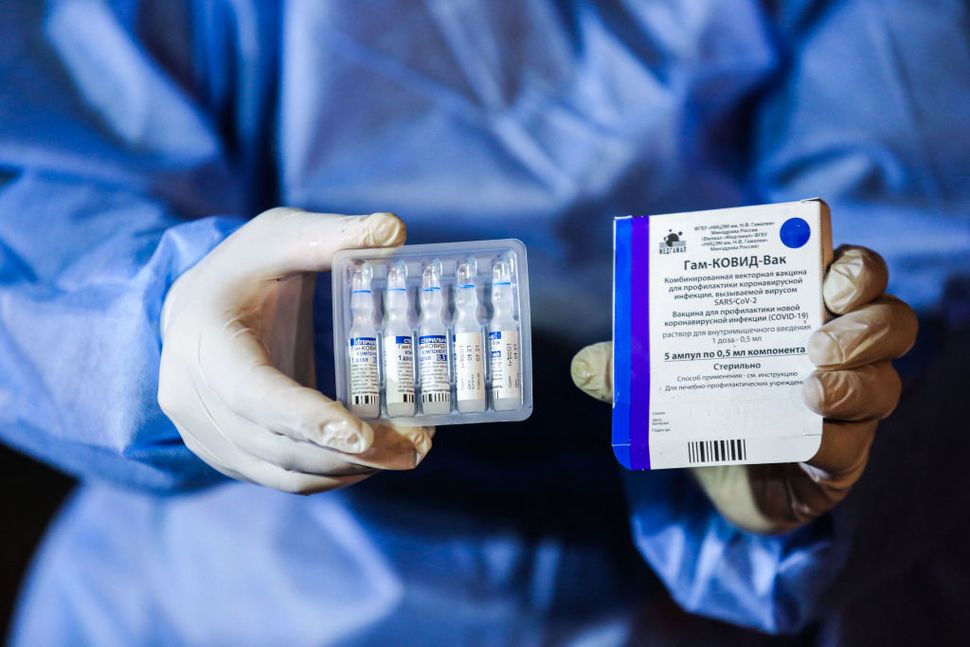Russia on Friday accused the U.S. of preparing a massive disinformation campaign to discredit Moscow's coronavirus vaccine, Sputnik V, in the eyes of European leaders and in other countries with which world powers seek greater relations. Citing an unnamed source from the Kremlin who referenced intelligence reports, Russian state news claimed the large-scale campaign will be, according to a translation, "aimed at creating a bias toward domestic scientific developments" of Russia's COVID-19 vaccine, particularly for countries that have already signed up to receive it. It also claimed the U.S. was pushing instead for countries to agree to receive its own vaccines, particularly one developed by Pfizer. The State Department and its Global Engagement Center – a relatively new office tasked with countering disinformation – did not immediately respond to requests for comment. However, Russia's claims follow similar assertions from U.S. officials and confirmed by State Department spokesman Ned Price earlier this week that Moscow was behind a similar campaign targeting U.S.-made vaccines. "It is very clear that Russia is up to its old tricks, and in doing so is potentially putting people at risk by spreading disinformation about vaccines that we know to be saving lives every day," Price said Monday.Those who track global disinformation campaigns say the Russian claims on Friday align with the State Department's apparent goals. "It's certainly the message they want Russians to hear," says Darren Linvill, an associate professor at Clemson University and frequent adviser to the government for social media misuse and disinformation campaigns. "This seems like it is more about their people than our people, and maybe to a lesser extent Latin America and Africa." The crossfire of accusations comes as world powers ramp up "vaccine diplomacy." These efforts attempt to capitalize on the seemingly herculean effort of developing inoculations to protect against the global pandemic within a year of its initial spread. Russia claimed to be first across the coveted finish line in August when it touted what it said was the world's first vaccine, named for the satellite from half a century earlier that helped establish the Soviets' world-class scientific prowess. That effort, mirrored by China following the announcement of its own vaccine, is widely seen as a successful effort to gain soft-power influence in strategic corners of the world, particularly in Africa, Latin America and parts of Asia. And it's magnified by the gaps created internationally through the lasting effect of the Trump administration's apparent nativist policy of buying up vaccines only for American use. The credibility of Russia's vaccine was panned initially for being rushed and widely dismissed as mere propaganda by the Kremlin. However, as countries faced few other credible prospects for relief as virus cases skyrocketed globally, Russia in the interim surged ahead of the U.S. in distributing the vaccine to vulnerable countries that would otherwise have to go without. European regulators are currently testing the vaccine, and an interim study printed in The Lancet found it to be more than 90% effective.[ MAP: The Spread of Coronavirus ]On Thursday, Russia secured a deal with India to sell more than 100 million doses of the virus, according to statista.com, which tracks vaccine distribution – making inroads with a global economic hub with which the U.S. has urgently sought closer relations in recent months to counter the rise of China. Russia also has agreed to sell more than 7 million doses to Mexico, and several European Union countries, including Hungary and Slovakia, also accepted sales before the economic bloc itself approved the vaccine. Meanwhile, President Joe Biden is facing new pressure to distribute more American-made vaccines globally while still accounting for the wide swathes of the domestic population that have not yet received a shot. "The Chinese and the Russians are advancing their vaccine diplomacy and are winning friends and influencing people and expanding their sphere of influence," J. Stephen Morrison, director of the Global Health Policy Center at the Center for Strategic and International Studies, told The Washington Post on Thursday.
Russia, U.S. Locked in Propaganda War Over Vaccines
0
0
SHARES
6
VIEWS
Leave a Reply Cancel reply
BROWSE BY CATEGORIES
BROWSE BY TOPICS
Alexa Lardieri
Associated Press
Best States
Best Stocks
Biden
business
Business News
China
Collections: Business
Collections: Top News
Collections: US
coronavirus
Donald
economy
education
Education Lab
elections
Financial Advisors
foreign policy
health
Healthiest Communities
Healthiest Communities Health News
Health News
infectious diseases
Investing 101
Joe
Lisa Hagen
lung disease
National News
News
Paul D. Shinkman
personal finance
picks
Politics
public health
Russia
Stock Market News
Susan Milligan
Trump
United States
vaccines
Washington Whispers
world
world news
World Report
Archives
- June 2022
- May 2022
- April 2022
- March 2022
- February 2022
- January 2022
- December 2021
- November 2021
- October 2021
- September 2021
- August 2021
- July 2021
- June 2021
- May 2021
- April 2021
- March 2021
- February 2021
- January 2021
- December 2020
- November 2020
- October 2020
- September 2020
- August 2020
- July 2020
- June 2020
- May 2020
Nsapk.com is the driving force behind decisions that largely define the quality of our readers’ and users’ lives.
- Trending
- Comments
- Latest
Biden to Faucet Former Sen. Invoice Nelson to Lead NASA
April 11, 2021
Neera Tanden Withdraws Her Nomination for OMB Director
August 17, 2021
Copyright @ 2021 Nsapk.com. All rights reserved.









